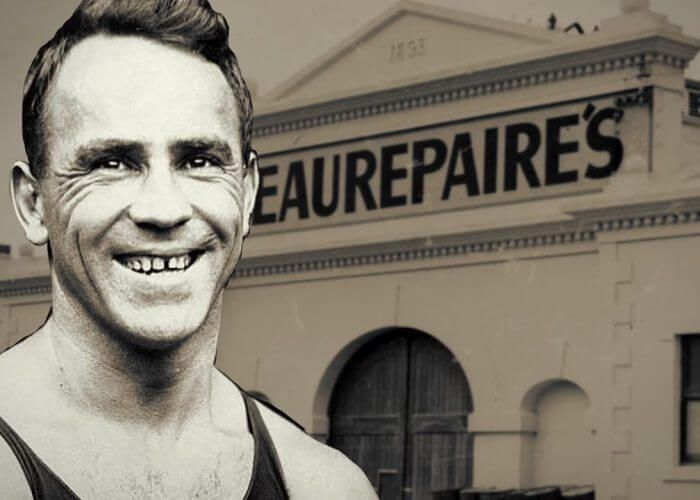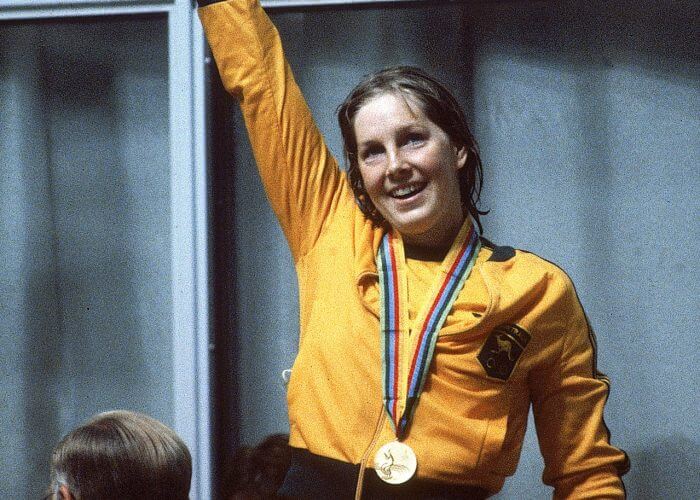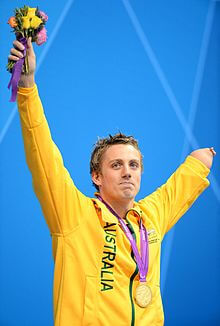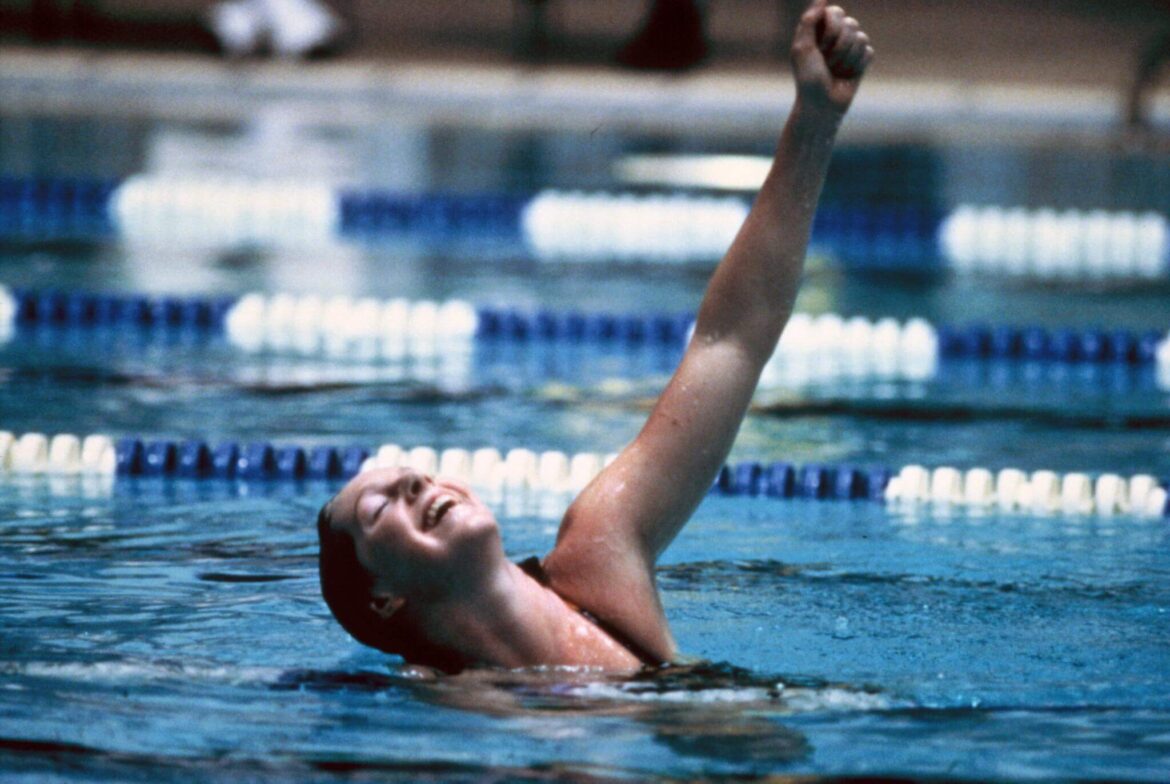Olympic gold medallists Michelle Ford and David Theile, prolific Paralympic gold medallist Matthew Cowdrey and six time Olympic medallist Sir Frank Beaurepaire have been inducted into the Swimming Australia Hall of Fame.
The 2025 Swimming Australia Awards yesterday celebrated the latest Hall of Fame inductees, recognising the extraordinary achievements of four legends of Australian Swimming.
Beaurepaire (Dolphin #3), arguably the greatest freestyler across three decades, breaking 14 world records; Cowdrey (Dolphin #P224) Australia’s most successful Paralympian with 13 gold medals across three Para Games; Australia’s first two-time back-to-back Olympic gold medal winning backstroker Theile (Dolphin #103) and Australia’s only individual Olympic gold medallist from the 1980 Moscoe Games in Michelle Ford (Dolphin #254) –
The foursome joining a who’s who of the sport – initial inductees Freddie Lane, Fanny Durack, Dawn Fraser, Shane Gould and Ian Thorpe (2022); Lorraine Crapp, Murray Rose, Suzie O’Neill (2023) and Boy Charlton, Pfriya Cooper and Kieren Perkins (2024).
DAVID THEILE AO
Born: January 17, 1938
For the record (Olympic Games): F Melbourne (1956): Gold (100m backstroke);Rome (1960): Gold (100m backstroke), silver (4x100m medley relay);Queensland and Australian Junior Champion: 1947Australian Champion: 1955.Australian Records: 1955 (100m Backstroke).
BACK-TO-BACK: Australia’d David Theile wins his second Olympic 100m backstroke gold in Rome. Pic tired with US silver medallist Frank McKinney (left) and bronze medallist Bob Bennett.Phoyo Courtesy Wikipedia.
At the 1960 Rome Olympics, David became the only swimmer other than a freestyler to win gold medals in two successive Olympics since World War II, winning back-to-back 100m backstroke gold medals in both the 1956 Melbourne home Olympics and 1960 Olympic Games.
He began competitive swimming aged nine and became the Queensland and Australian Junior backstroke Champion at 16, before beginning a five-year reign as the Australian open champion in 1955, at 17.
When Thiele set the Australian 100m backstroke record at 1:07.4 in 1955, he broke a 17-year-old record set in the year he was born – 1938, (1:07.8 by Percy Oliver).
Thiele won the 100m backstroke crown at the 1956 Melbourne Olympics in world and Olympic record time, 1:02.2. In Rome four years later, he lowered his Olympic record to 1:01.9 for a second gold medal and was part of the Australian silver medal medley relay.
Inducted into Sport Australia Hall Of Fame: 1985
Inducted into International Swimming Hall Of Fame: 1968
SIR FRANK BEAUREPAIRE
Born: May 13, 1891; Died: May 29, 1956; Age: 65
For the record (Olympic Games): London (1908) Silver, 400m freestyle; bronze, 1500m freestyle; Antwerp (1920) Silver, 4x200m freestyle relay); bronze, 1500m freestyle); Paris (1924): Silver (4x200m freestyle relay; bronze, 1500m freestyle.World Records (14): 200m, 500m, 1000m, 1 mile freestyle);

FREESTYLE LEGEND: Sr Frank Beaurepaire.Photo Courtesy Herald Sun.
Often recognised as the greatest swimmer across several eras in the early 1920s, Frank Beaurepaire swam the trudgen stroke in a competitive career that lasted from 1903 to 1924. Winning a total of six Olympic medals, – three silver and three bronze – across three Olympics (1908, 1929, 1924) a span of 16 years. The last – a second bronze in the 1500m behind Australian gold medallist Andrew “Boy” Charlton in Paris, 1924. Beaurepaire was 33.
In a remarkable career, Beaurepaire set five world records from 200m to 500m in 1910, his best year, but was still setting records 11 years later, this time in the 1000m and the mile. In 1910 he toured Europe undefeated.
In all he set 15 world records over a 13-year span, winning 34 Australian titles, 79 Victorian titles and 11 British Championships.
Beaurepaire or “Bogey” as he was known, won more than 200 first class swimming championships and his fastest times were done when he was past 30 and his career could have seen him achieve so much more. He was banned from the 1912 Games for earning money as a swimming teacher, robbing him of further honours, returning to the Olympic stage again in 1920 and 1924.
Beaurepaire became Melbourne’s Lord Mayor and was a principal organizer of the 1956 Olympics. He died of a heart attack in a barber shop in the middle of a typically full day in May 1956, just 5 months before “his” Olympic Games.
Inducted into Sport Australia Hall Of Fame and Inducted into International Swimming Hall Of Fame in 1967
MICHELLE FORD-ERIKSSON MBE
Born: July 15, 1962
For the record….
Olympic Games: Moscow (1980) Gold, 800m Freestyle; bronze, 200m Butterfly); Two World Records (800m freestyle)
Commonwealth Games: Edmonton (1978): Gold, 200m butterfly; silver 400m and 800m freestyle; bronze, 200m freestyle and 4x100m freestyle relay);
Brisbane (1982): Gold, 200m Butterfly; silver, 800m freestyle, Won Four Australian National Championships in the 200m butterfly

THRILLED: Michelle Ford on the gold medal podium. Photo Courtesy Russ McPhedran (Michelle Ford Collection)
At age 13 Michelle broke nine records, six NSW State and three Australian – all in three days. Two of those records were by held by Hall of Famer Shane Gould and world champion Jenny Turrall.
That same year she earned a spot on the 1976 Olympic team, the second youngest Australian ever to do so.
Just one year later, Michelle set her first world record in the 800 freestyle. Little did she know her times in the 800 freestyle would someday beat the times swum earlier by the immortal Murray Rose and John Konrads.
Michelle continued her winning streak at the 1978 Commonwealth Games, taking a gold in the 200 butterfly, two silvers in the 400 and 800m freestyle and two bronze medals in the 200 freestyle and 4x100m freestyle relay.
But Michelle Ford’s greatest feat came in the boycotted Moscow 1980 Olympics under extraordinary circumstances following Russia’s invasion of Afghanistan.
Winning the gold medal in the 800 freestyle and conquering the might and power of her East German opponents adding bronze in the 200 butterfly.
A Games that became shrouded in a political firestorm following demands from the Australian government to boycott the Games.
But a defiant Olympic team that left Australian shores in 1980 under a cloak of darkness, heading off to secret training camps receiving death threats and branded as traitors as they prepared for the Games.
Their blazers hidden in their luggage with a coat of arms tucked away rather than sitting proudly on their chests, many of them teenagers, like Michelle Ford, thrust into the middle of a political stoush that would define their sporting futures – but remaining unrecognised by the Australian Government for 50 years.
“Competing in the Olympics helped define everything I am today,” said Ford who that year was named Amateur Athlete of the Year.
Her name etched in gold in Moscow as an Australian woman did not win another Olympic gold in swimming for 16 years – when Susie O’Neill triumphed the 200m butterfly in Atlanta in 1996.
Inducted into Sport Australia Hall Of Fame: 1985; Inducted into International Swimming Hall Of Fame: 1994
MATT COWDREY OAM MP
Born: December 28, 1988
For the record (Paralympic Games): Athens (2004): 3 gold, 2 silver, 2 bronze; Beijing (2008): 5 gold, 3 silver; London (2012): 5 gold, 2 silver, 1 bronze
Commonwealth Games (3) Melbourne (2006): 2 gold; New Delhi (2010): 1 gold; Glasgow (2014): 1 silver
Inducted into Sport Australia Hall Of Fame: 2019

SIMPLY TGHE BEST: Matthew Cordrey. Photo Courtesy: Swimming Australia
Born with a congenital amputation of his lower arm, Matthew Cowdrey clinched his first Paralympic gold medal as a 15-year-old at the Athens 2004 Paralympic Games which launched his decade-long domination in the pool.
Growing into one of the most influential athletes within the Australian Paralympic movement by the time he retired.
In addition to his 23 Paralympic medals (13 gold, seven silver, three bronze), he won 21 medals at three World Championships (16 gold, three silver, two bronze), and broke dozens of world records – his first at just 13.
During Matthew’s prolific eleven-year para-swimming career, his tremendous talent saw him develop into an influential athlete who played an instrumental role in raising awareness of the Paralympic movement within Australia.
His strength in the 100m freestyle and 200m individual medley events earned him 57 international medals including 23 world championship and three Commonwealth Games gold medals.
By his retirement at the age of 26-years-old, Cowdrey had become the most decorated Australian Paralympian in history, with a total of 23 Paralympic medals including 13 gold across three Paralympic Games.
He left para-swimming holding five world records, five Paralympic records and nine short-course world records.
Matthew retired in 2015 at just 26 years old, but even at such a young age, stood as the most prolific Australian Paralympian in history, having won a total of 23 Paralympic medals including 13 gold.
Matt was awarded the Order of Australia Medal (2005), Australian Paralympian of the Year (2008) and Young South Australian of the Year (2009).
He also established a notable career since the London 2012 Paralympic Games, where he eclipsed Paralympic runner Tim Sullivan’s record of 10 gold medals. Today, Cowdrey is a Member of Parliament for Colton, SA.
